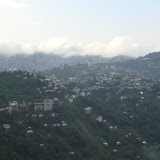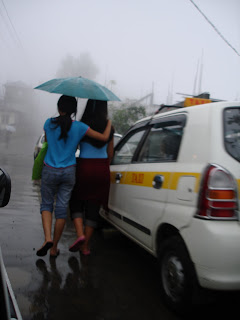Seilen Haokip is the spokesperson for the Kuki National Organisation. The Kuki are a minority tribe in this region dominated by the Meitei, Mizo and Naga tribes. All three tribes geographically exist in the region of present day Manipur, northern Myanmar, north eastern Bangladesh, Mizoram and Nagaland. The Kuki occupy most of the mountainous lands of Manipur, which is almost 90% of the state, and the balance in the plains is taken up by the Meitei, the political masters of the state.
Historically, the Kuki have been maligned, betrayed, and generally sinned against. It began from British times and continued by India. It is only of late that the central government has negotiated an understanding with the KNO, and this should soon reach public awareness. Seilen, an articulate academician, is a Kuki himself, and I can see the fervour in his eyes. He is troubled by many things he has learned and has to deal with. Yet, he speaks for many of us when he says they want a comprehensive understanding of their situation and that peace and amity can only be achieved within the framework of the Constitution of India. Their stated objective is statehood and not secessionism. They want to be given the right to administer themselves. We already have examples of similar political demands in Jharkhand and Uttaranchal, though the latter is more administrative rather than political.
There are plenty of separatist, militant organisations in this region with the UNLF, a Meitei group, and the NSCIM, a Naga group, most radical in their demands. The Kuki also have their own, but these groups demands are from the government of Myanmar. The KNO are not considering any others than those Kuki who are already legally resident in India, mostly in Manipur.

I learned a little bit more about India once more. There's so much of these areas that we are blissfully uninformed about. I recall a call from a friend in Calcutta on my first day here who expressed genuine surprise that I had chosen this particular destination for my vacation. His parting words to me were to be careful I didn't get caught in a presumed crossfire between militants and security forces. Many in mainland India believe the north eastern lands to be constantly in a state of strife with no peace or security at all. My only question to them is how do they think most of the citizens of these areas survive quite happily and successfully day to day? We have serious strife and turmoil in the mainland as well, never forget. And these issues are about identity too. Identity relating to community, belief systems, and the constantly burning issue of the rich-poor divide.
What's different here? Probably the media and vested interests making more of the separatist and secessionist demands of the extremists than is actually warranted. And not adequately acknowledging peaceful and reasonable movements like the KNO who want to work within the Indian polity. This is more significant and important, despite the aura and fascination that extreme activism holds for some sections of the youth.
Seilen must return to the family. It's his son's fourth month today and understandably wants to be home with them after our long chat. I put him in touch on the phone with my dear friend and senior journalist, Paranjoy. They plan to meet in Delhi next week to see what can be done for the right and proper media coverage.
*******
 Jane and Zo have a castle in the skies. Literally. I can see their house from the balcony of my hotel room. It perches at the edge of a hill just below the Aizawl Theological College at Durtlang. (Dur means cloudy and Tlang means hill in Mizo, by the way). Its location offers a wide-angle view of Aizawl city sprawled across seven hills. Absolutely amazing, and when viewed at night as I did, very charming too.
Jane and Zo have a castle in the skies. Literally. I can see their house from the balcony of my hotel room. It perches at the edge of a hill just below the Aizawl Theological College at Durtlang. (Dur means cloudy and Tlang means hill in Mizo, by the way). Its location offers a wide-angle view of Aizawl city sprawled across seven hills. Absolutely amazing, and when viewed at night as I did, very charming too.They are a well-informed, urbane, and delightful couple with two very well brought up sons. It was a pleasure meeting them the first time, and it is equally a pleasure this time. Over whisky and dalmoth bought at a BSF canteen, we exchanged notes and talked of this, that, and the other. Jane's home cooked Mizo meal was worth all the many helpings I took. Bai – a most wondrous dish that is like a soup flavoured with pork pickle, the Mizo chilli, and cubed portions of the stem of a cousin of the banana tree! There was also a tasty beef curry, dal made with local saag, a fish curry, boiled and salted river snails, boiled squash, and a green salad which featured the roots of the onion plant, and of course sticky, reddish Mizo rice. Too much!
Jane joked that maybe Ravi needed to get married to a Mizo girl so that I could have more such meals. Ravi called the suggestion, “Food for thought”. I think he sounded serious.
MONDAY
I start receiving Bijoya greetings through SMS from Calcutta early in the morning. The Pujas have passed me by and I didn't even miss it!
Ravi comes over to the hotel and we spend a lazy morning chatting, listening to music and demolishing a healthy portion of a bottle of whisky. The hotel kitchen today has also cooked Bai and we ask for it. This is different from what we had last night. It is more like a thick soup made with the leaves of the kochu plant. It has a smoky flavour and is absolutely delicious with the Mizo rice. Later we walk down to the bazar and I buy a kilo of Mizo rice to take back with me. I have this fascination of buying the local rice from wherever I visit and it is the best souvenir I can think of. Also bought latkhora – the flavoursome juice of a lemon that is widely available here. It goes well with vodka!
TUESDAY
The last day here but I don't feel sad. I know I'll return. It's not goodbye, but see you soon. The Bengali has a nice way of saying it when they part company, “Ashi - I'll be back”. A sense of continuity is important for the human spirit. The last two days here in Aizawl have had picture perfect weather. The air sparkles with the sunshine of incoming winter through the moisture of the rain that still seems to be hanging around. It is bracing and invigorating. We down a quick one for the road and set out downhill to Lengpui.
 At a small village bazar near the airport I decide to buy some local produce. The papayas look healthy. There are fresh bamboo shoots and ginger on the stalk. There's ginger flowers, the latkhora and its juice in reused bottles, herbs of various kinds, the dried and sliced peel of the latkhora which can be used for flavouring dal and curries, even tiny river crabs in small palm-leaf containers.
At a small village bazar near the airport I decide to buy some local produce. The papayas look healthy. There are fresh bamboo shoots and ginger on the stalk. There's ginger flowers, the latkhora and its juice in reused bottles, herbs of various kinds, the dried and sliced peel of the latkhora which can be used for flavouring dal and curries, even tiny river crabs in small palm-leaf containers.Airports anywhere are the same in their boring drudgery of security rituals. We've got more than a hour before the flight arrives from Imphal. Coffee, cigarettes outside in the car park, and hi-hello to people who Ravi knows helps pass the time. And then, in a short while I'm airborne and winging my way back to Calcutta. We fly way up high over Bangladesh, knowing that from the height we are at. Can't make out much, what looks like a wide winding river which at one point forms an oxbow lake. Airline food is always bad.
******
Calcutta is in the process of dismantlement. As I drive back from the airport, Puja pandals everywhere are being stripped down to their bamboo frameworks. This seems to be the eternal state that the city is in. A process of disrepair, a breaking down, and then quick-fix repairs to last a season at the most.
Yes, there is great art in the Pujas, but why is it so temporal? Is this a reflection of the Bengali psyche? Where we can only create beauty for a moment because we know it cannot last? Or is it that we do not attempt to create something that will stand the test of time? Are we shallow beings eventually? All the Bengalis, and the only ones who have left lasting impressions are pictures in a history book, just names of roads and institutions.
The solidity of the mountains and its peoples is a source of strength and inspiration for me. It renews my faith in the simple goodness that unspoilt nature offers you. This is why I must always go back to the mountains.
And Mizoram will always be a preferred destination.
___________
For more of my pictures of Aizawl, click on the picture below.
 |
| Mizoram Oct2007 |








